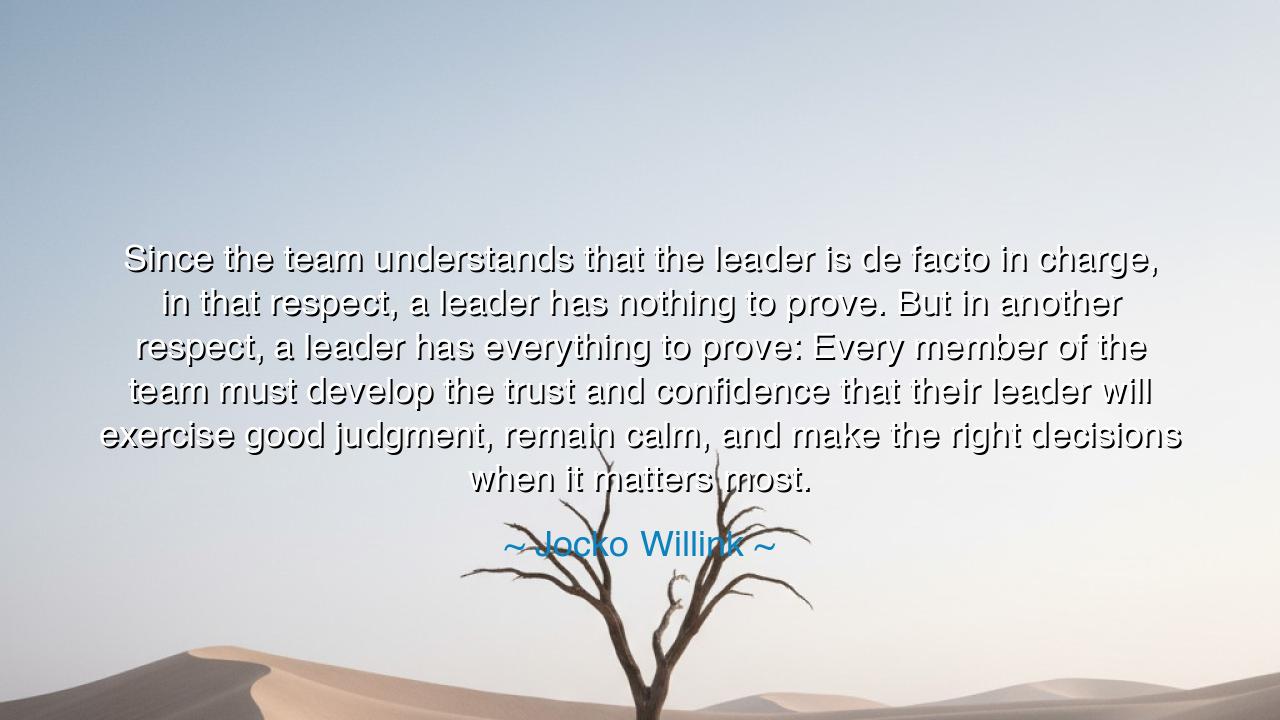
Since the team understands that the leader is de facto in charge
Since the team understands that the leader is de facto in charge, in that respect, a leader has nothing to prove. But in another respect, a leader has everything to prove: Every member of the team must develop the trust and confidence that their leader will exercise good judgment, remain calm, and make the right decisions when it matters most.






“Since the team understands that the leader is de facto in charge, in that respect, a leader has nothing to prove. But in another respect, a leader has everything to prove: Every member of the team must develop the trust and confidence that their leader will exercise good judgment, remain calm, and make the right decisions when it matters most.” Thus speaks Jocko Willink, warrior and teacher, whose wisdom was forged not in comfort but in the crucible of battle. In these words he unveils a paradox: that leadership is both a mantle granted and a burden continually tested. One who holds command need not shout to remind others of his station, yet he must live daily in such a way that the trust of his people is not squandered.
The ancients knew this truth well. The general at the head of the army was obeyed by rank, yet he ruled by trust. His authority was written in law, but his power was sealed in the hearts of his soldiers. When men march into peril, they follow not the title of their commander, but the steadiness of his gaze, the calmness of his hand, the righteousness of his choices. Thus, the leader has “nothing to prove” in his station, but “everything to prove” in his judgment. For titles are given by men, but loyalty is earned through character.
Consider the tale of Marcus Aurelius, emperor of Rome. None questioned that he was ruler—his crown was beyond dispute. Yet in the face of war, plague, and endless trial, his people looked to him not merely as emperor but as guardian. By his patience, his philosophy, his refusal to be consumed by anger, he proved his worth day after day. Had he been rash, had he been cruel, his reign would have collapsed into chaos. He showed the truth of Willink’s words: that leadership is not about clinging to power, but about wielding it with calmness and wisdom.
Contrast this with leaders who fail. Napoleon, once adored, betrayed the trust of his men through arrogance and reckless ambition. His soldiers followed him across frozen steppes, but when his judgment faltered, their loyalty crumbled. They saw that though he commanded armies, he no longer commanded himself. Thus his empire, vast as it was, fell not only from external assault but from the erosion of confidence within his own ranks. Authority may give the title of leader, but only sound judgment sustains it.
O children of the future, learn this: when you are given the mantle of leadership, know that the eyes of others are upon you. They will not always speak their doubts aloud, yet their hearts will weigh your every action. Do you rage when the storm rises? Do you crumble when decisions grow heavy? Or do you remain steady, calm, and measured, proving to them that your hand will not falter when it matters most? For it is in the darkest hour, when fear threatens to consume all, that the true nature of a leader is revealed.
The meaning is plain: leadership is service. It is not a throne upon which to rest, but a burden to be borne. The leader’s task is to instill confidence, to embody judgment, to show calmness when others panic. If you do this, your people will follow you not out of duty, but out of trust. And trust, once forged, is stronger than iron. But beware: if you betray it, it shatters swiftly, and the shards can never be fully restored.
Therefore, let your practice be this: when you lead, speak little of your position, but much through your actions. Remain calm in conflict. Listen before you command. Consider long before you decide. And when the time comes to act, do so with clarity and resolve. In this way, you will prove yourself—not once, but continually—and your people will follow you even into the fire.
So I say unto you: remember the paradox of Willink. As leader, you have nothing to prove, yet everything to prove. Titles may place you above men, but only trust will keep them at your side. Lead not for yourself, but for them. And if you do, your name will be remembered, not for the power you held, but for the wisdom with which you held it.






AAdministratorAdministrator
Welcome, honored guests. Please leave a comment, we will respond soon